UNESCO AND THE ISSUE OF CULTURAL DIVERSITY Review ... - ITI
UNESCO AND THE ISSUE OF CULTURAL DIVERSITY Review ... - ITI
UNESCO AND THE ISSUE OF CULTURAL DIVERSITY Review ... - ITI
You also want an ePaper? Increase the reach of your titles
YUMPU automatically turns print PDFs into web optimized ePapers that Google loves.
was no scientific oasis for prejudice according to ethnie differences, they<br />
would automatically become more accepting and support racial equality (p.<br />
204). Of course, while representing an important element of the struggle to<br />
promote equality, this position ignores the political motivations for<br />
perpetuating misconceptions and constructing ethnie difference as indicative<br />
of natural inequality or socio-political distinctions.<br />
Even the cultivation of international solidarity could be a politically<br />
sensitive issue, as evident in the section on education in the 1952 Report. In<br />
saying that education ‘covered the individual’s sense of loyalty towards his own<br />
country and towards the human community, his consciousness of belonging to<br />
one vast family, his confidence in the international institutions which maintain<br />
and extend union and peace among all the peoples of the world’ (p. 21 l), the<br />
Director-General had to specify that this did not entail replacing national loyalty<br />
with international loyalty, but fulfilling international obligations through state<br />
patriotism and national obligations. This two-level structure, with the state level<br />
remaining the most important but not the sole platform for loyalty, was the<br />
definition of a ‘civisme international’, the best an international organization<br />
dependent on the support of its member states could hope to encourage at this<br />
point. However conservative, this conception was still qualitatively different from<br />
a solely inter-state mode1 with each state completely autonomous and selfsufficient.<br />
As the report emphasized, international reality (‘International relations<br />
have been developed throughout the world to such an extent that now the<br />
nations are interdependent to a degree hitherto undreamt of’) created a ‘new<br />
field of duties’ that states could not ignore. With this in mind, ‘The entire<br />
programme of <strong>UNESCO</strong> bears witness to the existence and encourages the<br />
growth of community’ (p. 213). The Project for a ‘Histoire du développement<br />
scientifique et culturel de l’humanité’, unlike that of the Histoire des civilisations,<br />
reinforced the idea of the unity of the human family, and the interconnectedness<br />
of progress and development in all areas of the globe.<br />
The 1960 Director-General’s Report added two interesting reflections to<br />
the ‘Major Project on mutual appreciation’ between the Occident and the Orient.<br />
First, the emphasis on ‘Programmes for the general public’ (p. 157) highlighted<br />
the importance of diffusing culture, not just among the intellectuals of different<br />
countries, but to the people within countries themselves. Second, the terms<br />
used to describe the process of cultural exchange could equally be applied to<br />
political exchanges among different cultures, revealing the potential sensitivity<br />
of such endeavours: ‘The meeting of persons representing various branches of<br />
the arts and literature provided opportunities of continuing the comparison of<br />
spiritual values and standards of aesthetic appreciation n East and West, due<br />
allowance being made for the important differences arising from the<br />
personalities of the artists and the fact that they still draw their inspiration from<br />
widely varying cultures’ (p. 161). Individuals are not determined by their<br />
cultures, but their ways of perceiving and being in the world are necessarily<br />
influenced by them. Understanding this precise developmental correction and<br />
the implications it cari have for interactions among people influenced by<br />
different cultural backgrounds is just as important as learning about multiple<br />
cultures themselves, it is the question of how difference cari shape behaviour<br />
that is important, going one step beyond the mere acknowledgement that<br />
people from different cultures may react differently in the same situation.<br />
9


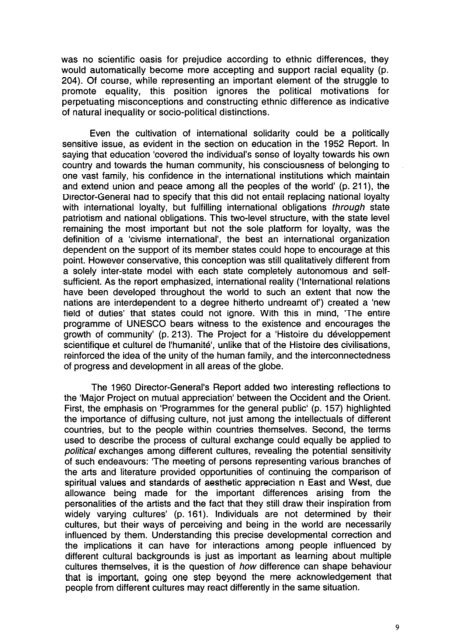
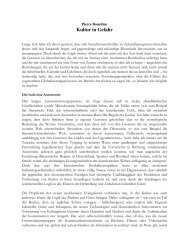
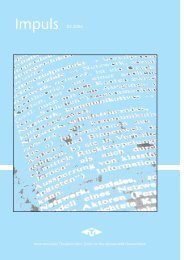
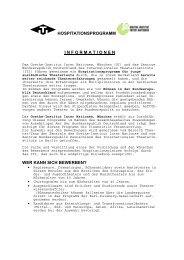
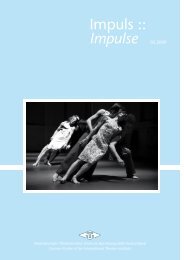
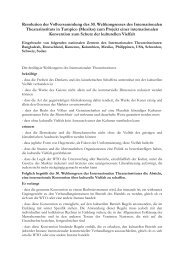
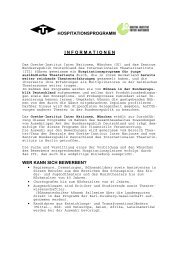
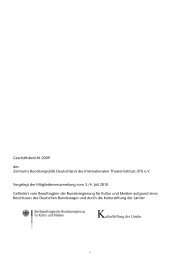
![Geschäftsbericht 2010 [pdf 2 MB] - ITI](https://img.yumpu.com/4380475/1/184x260/geschaftsbericht-2010-pdf-2-mb-iti.jpg?quality=85)